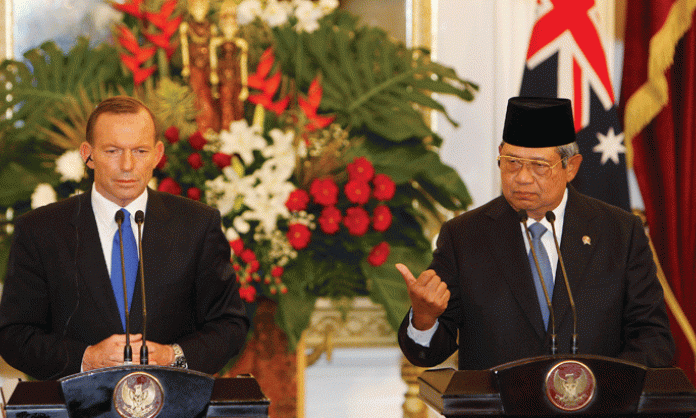Indonesian President Susilo Bambang Yudhoyono may just be posturing about Australian intelligence phone taps. But it wouldn’t be surprising if he was genuinely annoyed. There is a long history of Australian imperialism messing with the countries to our north.
Before and after independence, the republic of Indonesia has confronted several major forms of imperialism, and the scars are still visible. Australia’s oppressor role in this picture is often discreet, but it has been there for a long time, networking with the main imperial players, first the Dutch and later the USA.
In all of the history except for the Japanese occupation during World War Two, there is the irksome fact that the boss is white. Otherwise it’s pretty diverse.
“We have ruled here for 300 years with the whip and the club”, said the Dutch governor of Java, Bonifacius DeJonge, in 1935. So unpopular were the Dutch colonialists that they couldn’t mount a guerrilla campaign against Japan during the war – they lacked the support.
When the war ended in 1945, British forces and surrendered Japanese troops were used to fight against a rising independence movement. In Sumbawa, after clashes between Indonesian nationalists and Japanese forces, the latter were told to “shoot to kill”.
In the eastern islands, Australian troops also tried to smash the independence fighters. George Bliss of the 7th Division recalled: “About six weeks after the war ended we were told we were going into Sulawesi ‘to supervise the rounding up of the Japanese’. We realised later that it was to prevent the locals organising against the return of the Dutch.
“We went by ship to Makasar. On arrival we were lined up on the wharf, fully equipped in battle order, and marched through the town out to the Dutch barracks about three miles out. That was the first act of intimidation.”
The Australian leaders were determined to complete this colonial mission. And so, whatever their personal sentiments, the Australian troops helped entrench Dutch control. Australian operations in Sulawesi paved the way for Dutch Captain Paul Westerling, who developed ferocious new tactics in counter-insurgency. Emboldened by success, the Dutch used more repressive tactics in Java.
At this stage, the Chifley Labor government was still calling unequivocally for the Dutch to get their colonies back. At the outset of World War Two, then Prime Minister John Curtin had spoken of defending “rights of free people in the whole Pacific”. It was nothing but empty rhetoric.
Canberra’s imperialist greed found expression in diplomacy. As the war drew to an end, Chifley and Foreign Minister Evatt first looked for ways to grab territory. On a visit to Washington, Evatt proposed that Australia assume post war control of Dutch Timor, West New Guinea and the Kei, Aru and Tanimbar Islands.
But by 1947 it became clear that rising nationalism across Asia would make such seizures impractical. In fact, Canberra would have to back the independence movement, like it or not.
“Surrounded as we are by non-Europeans”, said Chifley, “Australia could not be seen to be inactive”. By the end of the decade, Australia was posturing as Indonesia’s great friend, a game Tony Abbott is still playing.
But Australia, as a close ally of the US, and as a regional bully in its own right, soon dispelled that image. The West backed pro-Dutch regional rebellions. When President Sukarno called for a confrontation with the British after they moved to create Malaysia as an obstacle to wider regional unity of the Malay-related peoples, Australia sent troops to oppose the Indonesians.
In the diplomatic sphere, Canberra lobbied aggressively to get control of West Papua. But the US, which was now arbiter, blocked it. Australian companies had to settle for exploiting West Papua’s mineral wealth under the eye of the Indonesian army. They’ve happily done this for more than half a century.
There’s no evidence of direct Australian involvement in the 1965 coup, which led to the death of a million or more people, including destruction of the Communist Party. But Harold Holt made the government’s attitude clear when he gloated:
“With 500 thousand to a million communist sympathisers knocked out, I think it’s safe to assume a reorientation has taken place.”
Since the terrible bloodshed of 1965, Indonesia’s rulers have largely lived within the rules and assumptions laid down by imperialism. But despite the benefits they undoubtedly gain, they still don’t like being errand boys.
When it began to get strong economic growth in the mid-’90s, the government of General Suharto became mildly assertive towards the imperial bosses. When it felt threatened by Western demands for token reform, it tried to resist. The West responded during the Asian economic crisis, designing International Monetary Fund aid in ways that undermined Suharto and eventually forced him out.
Now Yudhoyono, in his turn also enjoying stronger growth than Australia, is getting assertive. He thinks if he writes Abbott a letter, the clown will have to read it. Also there is an election coming, and he wants to polarise the political mood – which he has done.
The phone tapping scandal created a diplomatic storm, but the mutual interest of each country’s rulers means this is unlikely to turn into a long-running drama. The Indonesian elites are basically on good terms with their Western allies like Australia. Joint exercises between the special forces of both sides (SAS and Kopassus) have been postponed, but not for long. Thirty Australian police are still stationed there. In the same way, Canberra generally supports its Indonesian counterpart.











